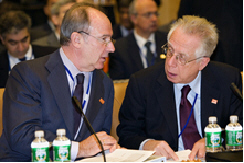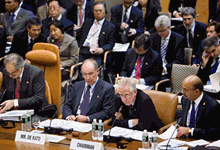
Typical street scene in Santa Ana, El Salvador. (Photo: iStock)
IMF Survey: IMFC Draws Lessons from Market Turmoil
October 20, 2007
- Key panel discusses lessons from financial turmoil
- Institutions urged to work together to better identify financial stability problems
- Good progress made on IMF governance reform
Against a backdrop of recent disturbances in financial markets, the IMF's main policy guiding committee called for the Fund and other international institutions to distill lessons from recent events and consider actions to prevent further turbulence and strengthen the foundations for sustained global growth.

Rodrigo de Rato (l) talks with new IMFC Chairman Tommaso Padoa-Schioppa of Italy at panel's meeting in Washington (IMF photo)
IMF POLICY GUIDANCE COMMITTEE
It pointed to the need to analyze recent market turbulence, identify and address information gaps, and provide for further discussions and actions.
In its October 20 communiqué, the International Monetary and Finance Committee (IMFC) said financial innovation and securitization, while having contributed to enhanced risk diversification and improved market efficiency, had also created new challenges "that need to be properly addressed."
The IMFC indicated that the areas to be addressed included risk management practices related to complex structured products; valuation and accounting for off-balance sheet instruments, especially in times of stress; clarifying the treatment of complex products by ratings agencies; addressing basic principles of prudential oversight for regulated financial entities; and liquidity management.
Wall Street tumble
The IMFC, which comprises 24 finance ministers from major developed and developing countries, met against the backdrop of renewed volatility in markets, with Wall Street stocks tumbling again this week after a period of recovery. The IMF had earlier cautioned that market adjustment to the fallout from the meltdown in the U.S. subprime mortgage market is likely to be uncertain and longer than expected.
The session, on the first day of the IMF-World Bank 2007 Annual Meetings, was chaired by Italian Economy and Finance Minister Tommaso Padoa-Schioppa, selected last month to succeed Gordon Brown as head of the key committee. It was the last IMFC meeting for IMF Managing Director Rodrigo de Rato, who will be succeeded by Dominique Strauss-Kahn on November 1.
At a briefing for reporters, Padoa-Schioppa said that while recent market turbulence had successfully been countered by timely and determined action by several central banks, it had also "revealed a number of problems that may be deeper than the specific episode that triggered the tensions."
"There are developments in the financial system which are like genies which moved out of the bottle and are hard to follow, to understand," he stated. "There is a clear need for supervisory bodies, and even for the very financial institutions which create these new instruments, to understand better what their creatures are doing out in the market. This is clearly a reason for concern." But he added that the good news was that the fallout from the meltdown in the U.S. subprime market had occurred at a time of abundant liquidity around the world when economies were strong.
Global economic outlook
Although the recent disturbances in financial markets are expected to have "a moderating effect on growth in the near term" and increase downside risks to the global economic outlook, the IMFC noted that the global economy "continues to be underpinned by strong fundamentals and the robust growth of emerging market and other developing economies." The IMF is predicting that world growth will slow from 5. 2 percent in 2007 to 4.8 percent in 2008, down from the 5.4 percent registered in 2006.
The IMFC said that central banks in advanced economies have been playing a critical role in ensuring the smooth functioning of money markets. At the same time, it underscored that "monetary policy should focus on achieving price stability while continuing to assess carefully the inflation outlook, taking into account both the inflationary pressures stemming from tight commodity markets and rising oil and food prices, and downside risks to growth."
On global current account imbalances, the IMFC called for "sustained implementation" of the policy plans reaffirmed at the spring 2007 IMFC meeting by the five participants—China, the euro area, Japan, Saudi Arabia, and the United States—following multilateral consultations on the imbalances organized by the IMF. Plans include steps to boost national saving in the United States, including continued fiscal consolidation; further progress on growth-enhancing reforms in Europe; further structural reforms and fiscal consolidation in Japan; reforms to boost domestic demand in emerging Asia, together with greater exchange rate flexibility in a number of surplus countries; and increased spending consistent with absorptive capacity and macroeconomic stability in oil producing countries.
As for the Doha Round trade talks—which have dragged on since 2001—the IMFC expressed concern with the continued lack of progress and urged World Trade Organization members to work toward "a prompt and ambitious conclusion."
Quota and voice reform
Another major focus of today's IMFC meeting was progress on the IMF's two-year program to reform the system of quota shares to reflect members' evolving weight in the global economy. The program, which was launched in Singapore one year ago to enhance the IMF's effectiveness, began with an ad hoc increase for the four most underrepresented countries: China, Korea, Mexico, and Turkey.
IMFC Chair Padoa-Schioppa told reporters that enough progress had been made over the past year to give hope that the essential elements of a reform package could be worked out by the next IMFC meeting, which will be held in Washington on April 12, 2008. The plan is to finalize the reform at the fall Annual Meetings in 2008.
The IMFC stressed that the second round of reforms should "be a further increase in the voting share of emerging market and developing economies as a whole." Such a shift will be based on a simpler and more transparent quota formula—the key outstanding item. The IMFC said it supported the inclusion of the following items in a quota reform:
• a GDP variable as the most important element;
• a role for GDP to be measured at purchasing power parity (instead of at just market exchange rates); and
• a role for a compression factor to moderate the influence of economic size.
One other key element of the reform includes an overall increase in quotas—which the IMFC said "should be of the order of 10 percent." The IMFC also stressed the importance of enhancing the voice and representation of low-income countries, and called for at least a doubling of basic votes to protect the voting share of low-income countries as a group.

IMFC in session (from l): IMF's John Lipsky, Rodrigo de Rato; IMFC's Tommaso Padoa-Schioppa; IMF's Shailendra Anjaria (IMF photo)
Other aspects of reform
The IMFC discussed other areas where the IMF has stepped up its reforms to cope with a world of highly interconnected markets and ever expanding capital flows.
Income. The IMFC welcomed the progress made in developing operational guidelines to implement the recommendations of the Committee of Eminent Persons chaired by Andrew Crockett. It noted that both income and expenditure need to contribute to putting the Fund's finances on a sustainable footing. On the spending side, it noted the Fund's ongoing efforts to reduce administrative expenditures but said it saw need for greater efficiency and saving through Fund-wide priority setting. The IMFC called for specific proposals on the new income model by the 2008 spring meetings and agreement on a medium-term budgetary envelope for the FY2009 budget that is consistent with the emerging income and expenditure model.
Surveillance. The IMFC welcomed the progress on strengthening IMF surveillance, including the June 2007 decision on bilateral surveillance—which involves the advice (including on exchange rates) that the IMF offers its 185 member countries.
Emerging markets. The IMFC said it supported the priority being given in the Fund's policy advice to emerging market economies "in working with them on the timely identification of vulnerabilities, the strengthening of debt management practices and deepening of local capital markets, and the design of policy responses in the face of large capital flows." It noted the work on designing a new liquidity instrument and asked the Executive Board to continue its work on the instrument's design.
Low-income countries. The IMFC welcomed the progress on clarifying the IMF's role in low-income countries. This included well-designed financial and policy support in the context of surveillance, Fund arrangements, and technical assistance.
In a tribute to outgoing IMF Managing Director Rodrigo de Rato, the IMFC thanked him for his skillful and strategic leadership. "As architect of the Fund's Medium-Term Strategy, he has positioned the Fund well to meet the challenges of a rapidly evolving global economy," it said. The IMFC noted that de Rato had deepened the integration of financial sector issues in the Fund's work and launched a bold reform to strengthen the voice and representation of low-income and emerging market countries in the Fund. It said he had also brought clarity to the role of the Fund in its bilateral surveillance and successfully introduced the new multilateral consultation instrument.


